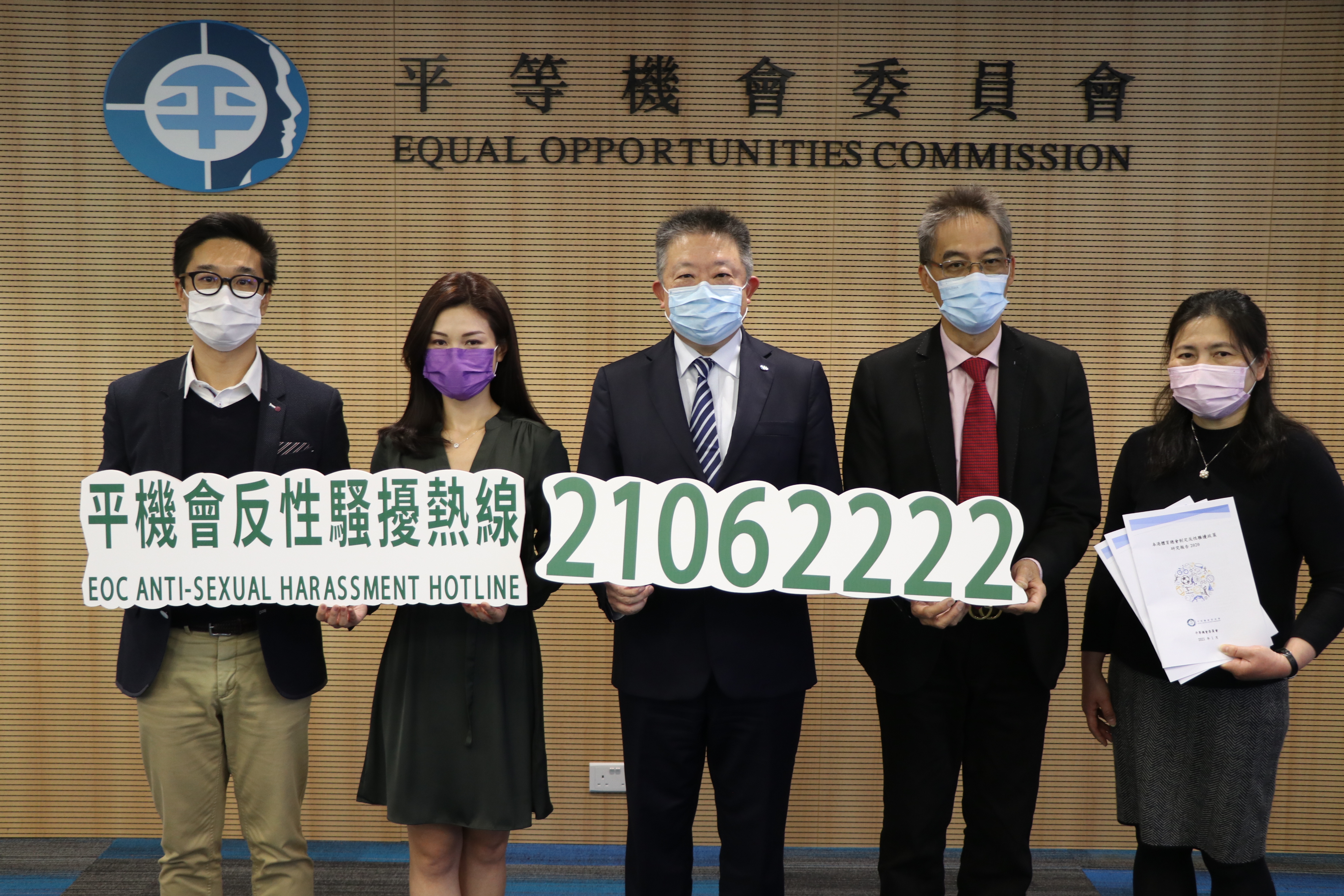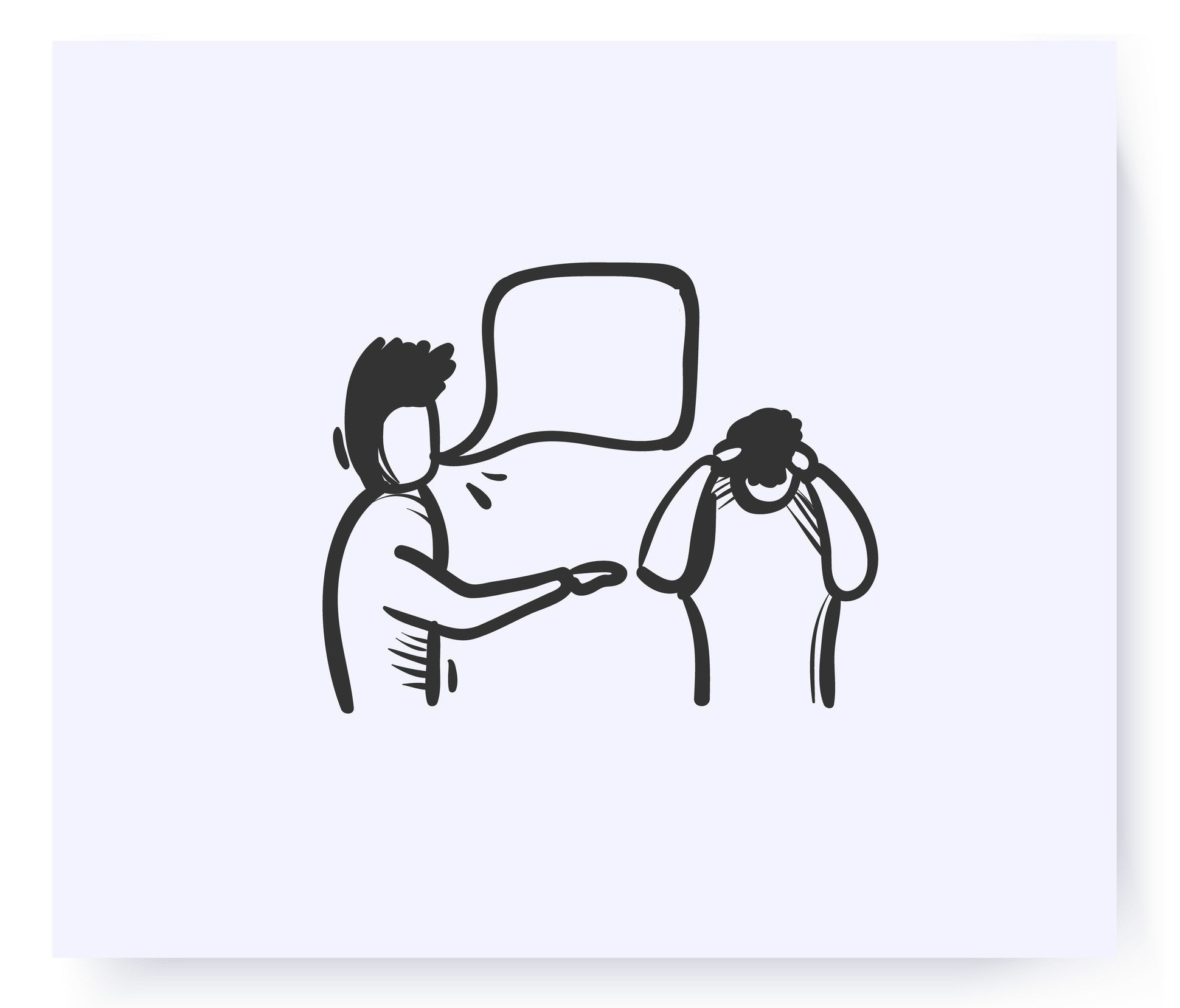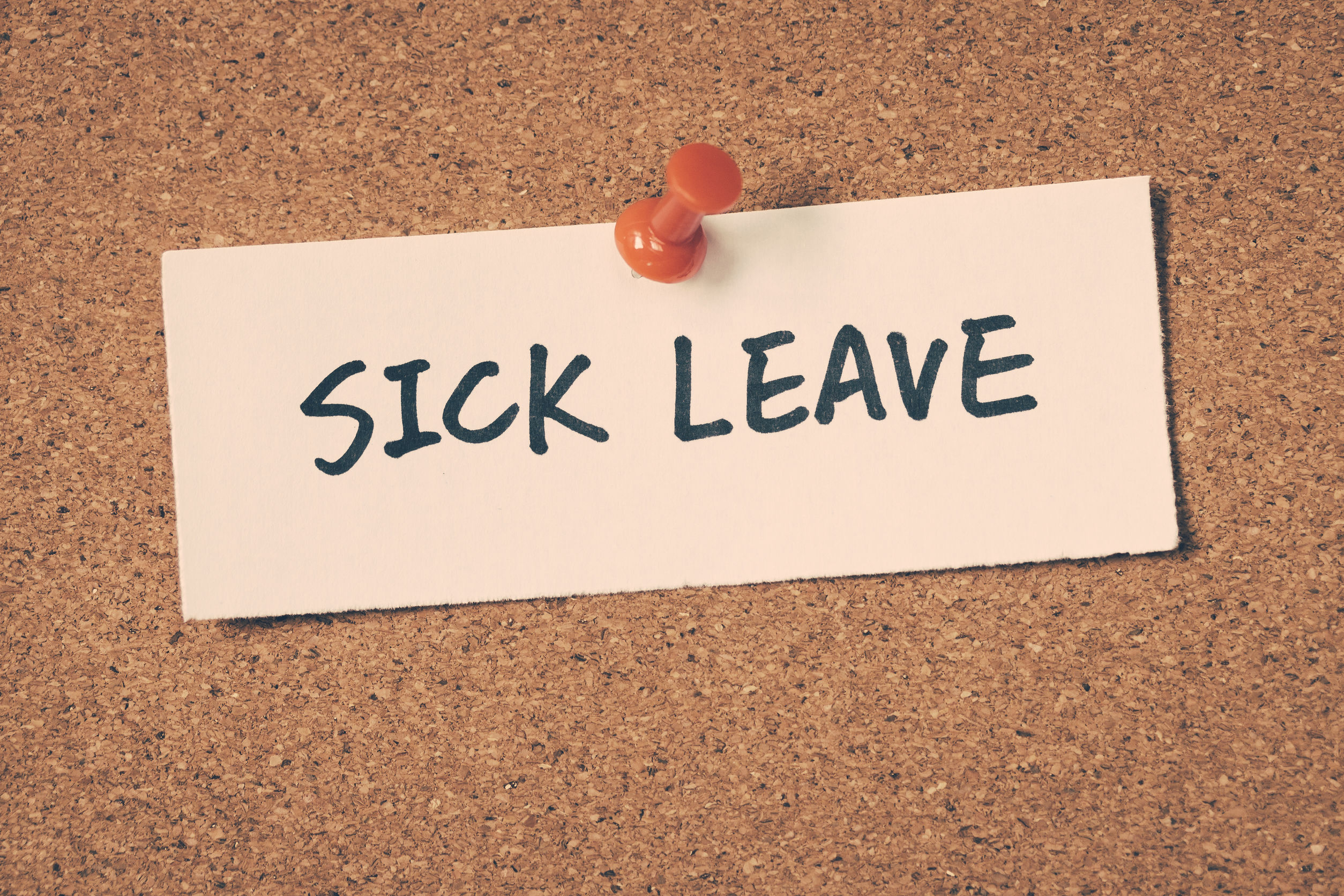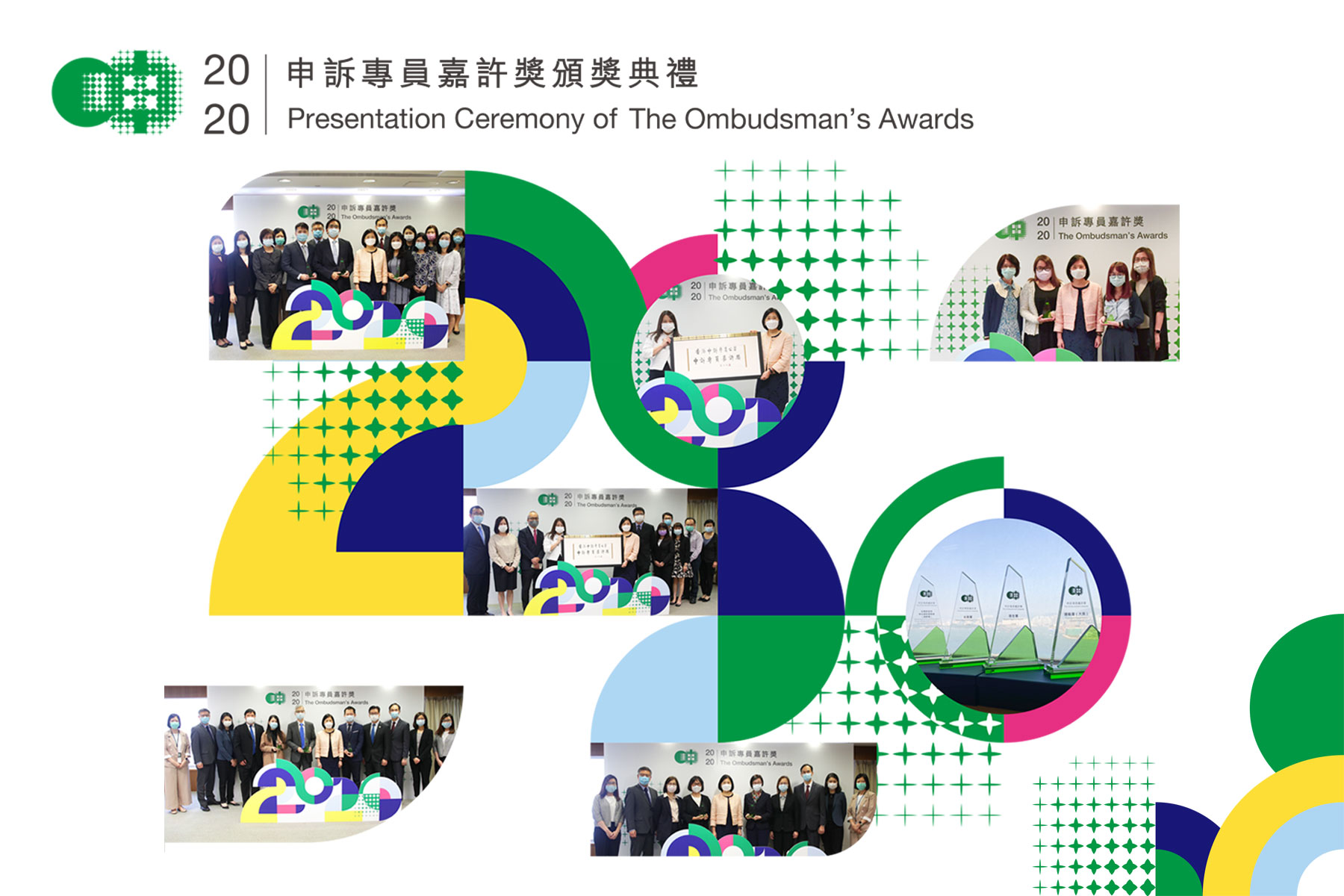
The EOC unveiled the findings of its latest study on the formulation of anti-sexual harassment (ASH) policies among National Sports Associations (NSAs) in Hong Kong at a press conference on 25 January 2021, during which the Commission also announced the launch of a new hotline at 2106 2222 dedicated for enquiries on sexual harassment.
Based on desktop research, the study revealed significant progress made by NSAs in formulating ASH policies and enhancing their transparency, as 71 out of 79 NSAs (90%) were found to have developed an ASH policy and/or code of conduct on ASH for coaches or instructors and posted them on publicly viewable websites as of October 2020. The figures represent a significant improvement from a 2018 EOC survey, where only 35% of responding NSAs indicated they had a policy or code of conduct in place and even less (29%) had posted them online.
However, a considerable proportion (37%) of self-financed NSAs, i.e. NSAs that are not subvented by the Leisure and Cultural Services Department (LCSD), had not formulated an ASH policy nor a code of conduct. Furthermore, even among NSAs with an ASH policy, essential elements of an effective policy were lacking in some instances. For example, 26% of these NSAs had omitted the name and contact information of the person(s) designated to handle complaints, while 33% had not given assurance that no one would be penalised for complaining in good faith.
Addressing these areas for improvement, the EOC recommended that each NSA should consider designating a person as a Gender Focal Point (GFP) who can ensure ASH policies are properly implemented and arrange relevant training for staff and athletes, and that the Home Affairs Bureau and LCSD should explore the setup of a GFP network to connect sports organisations and encourage self-financed NSAs to adopt preventive measures. The network could include District Sports Associations to widen the adoption of ASH policies and strengthen protection for young athletes.
The EOC also plans to organise seminars and workshops for the sports sector later this year, with a view to raising awareness of the latest changes to the Sex Discrimination Ordinance that have broadened the scope of protection against workplace sexual harassment.
In addition to the research findings, the EOC announced the launch of its Anti-Sexual Harassment Hotline (2106 2222) which would provide callers with information on relevant laws, advice on where to lodge complaints and seek redress, and referral to counselling and therapy services when needed.
Positioned as a first port of call for people affected by sexual harassment as well as employers looking to learn about their potential liability, the hotline is manned by the EOC’s newly established Anti-Sexual Harassment Unit and operates from 8:45am to 5:45pm, Monday to Friday (except public holidays and when special service arrangements are in place to minimise the risk of COVID-19 transmission as posted on the EOC website). The Unit is also set to conduct a holistic review of the current legal regime, in order to identify protection gaps and recommend legislative amendments where appropriate.
Click the links below for more detail on the research and the hotline.
Read the research report
More on the hotline
Read the press release
2

As the fourth wave of COVID-19 infections rages on in Hong Kong and cases surged in some districts, Mr Ricky CHU Man-kin, EOC Chairperson recently published an article in Hong Kong Economic Journal, South China Morning Post and The Stand News, calling on all sectors to avoid racial bias and labelling in conversations about the pandemic.
“Nerves are frayed, fears are rife and fatigue is at an all-time high, making it a perfect climate for tolerance and empathy to be in short supply. However, at no other time have we needed them more. Given the helplessness we all feel against this invisible foe, it is easy to pick scapegoats to blame and focus our anger on. We have seen this on a global level with country heads playing the blame game against other countries, turning on people with every surge in cases. Back in Hong Kong, it has happened with mainland Chinese at the initial stages of COVID-19 to the recent targeting of the dance cluster members to foreign domestic workers and most recently the ethnic minority communities in the Yau Tsim Mong district,” wrote Mr Chu.
He continued, “But in the same district two months ago, we bore witness to an outpouring of compassion and solidarity following a tragic fire that claimed the lives of eight members of our local Nepalese community and caused injuries to many more. When speaking with members of the Nepalese community, I was overwhelmed to hear of the support they had received from the people of Hong Kong, not just fellow ethnic minorities. Indeed, we should all be talking about what we share in common rather than focus on the differences. We are all Hongkongers with shared dreams and aspirations for this beautiful city we call home. This is a time for us to come together as one human race. The virus makes no distinction; it would be a folly for us to.”
Read the article
3

On 22 January 2021, the EOC issued legal proceedings under the Sex Discrimination Ordinance (SDO) in the District Court, on behalf of a woman (the Claimant) who worked as a dishwasher in a restaurant run by her previous employer (the First Respondent). She claimed that her former colleagues (the Second Respondent and Third Respondent), who worked as chefs in the restaurant, sexually harassed her in the workplace on a number of occasions by making sexually abusive remarks to her or in her presence; and that they had engaged in conduct of a sexual nature that created a hostile or intimidating work environment for her. She further claimed that the First Respondent was vicariously liable for their acts of sexual harassment because he failed to take any reasonably practicable steps to prevent these two employees from doing such acts.
In addition, the Claimant was dismissed by the First Respondent after she had made several internal sexual harassment complaints against the Second Respondent and the Third Respondent. She therefore claimed that she was victimised by the First Respondent.
Under the SDO, sexual harassment occurs if the harasser engages in any unwelcome conduct of a sexual nature in relation to the victim in circumstances in which a reasonable person would have anticipated that the victim would be offended, humiliated, or intimidated. Further, sexual harassment also occurs if the harasser, alone or together with other persons, engages in conduct of a sexual nature which creates a hostile or intimidating environment for the victim. Conduct of a sexual nature includes making a verbal or written statement of a sexual nature to the victim or in her presence.
Discrimination by way of victimisation occurs if an employer treats an employee less favourably because the employee has given information or evidence in connection with proceedings brought under the SDO or alleged that another person has contravened the SDO.
Sexual harassment between employees is unlawful under the SDO. An employer can also be held vicariously liable for the unlawful sexual harassment acts of an employee (whether or not done with the employer’s knowledge or approval) unless the employer can show that he/she has taken reasonably practicable steps to prevent the employee from doing the unlawful acts.
By taking this case to court, the EOC hopes to raise public awareness on the law on sexual harassment, and send a strong reminder to employers that they should take reasonably practicable steps to prevent sexual harassment from occurring in their workplace.
Read the press release
Access the EOC’s anti-sexual harassment resources
4

On 28 January 2021, the EOC issued legal proceedings under the Disability Discrimination Ordinance (DDO) in the District Court, on behalf of a person (the Claimant) who previously worked for a company (the Respondent) as an officer carrying out clerical and accounting duties.
The Claimant had been suffering from neck pain for a long time and was diagnosed with cervical spondylosis and radiculopathy (collectively referred to as the “disability”). Upon medical advice, she decided to take sick leave to attend physiotherapy. Subsequently, she informed her supervisor of her need to take physiotherapy twice a week and was dismissed five days afterwards. She believes the dismissal was a result of disability discrimination in that the Respondent terminated her employment on the ground of her disability and/or her need to take sick leave to attend physiotherapy sessions.
The DDO protects persons with disability against discrimination, harassment and vilification. Under the DDO, it is unlawful for an employer to dismiss an employee on the ground of the employee’s disability or for the fact that the employee takes sick leave as a result of the disability.
By taking this case to court, the EOC hopes to enhance public knowledge of the rights of employees under the DDO, and remind employers that it is a contravention of the DDO to discriminate against an employee on the ground of disability by dismissing him/her.
Read the press release
Read the Code of Practice on Employment under the DDO
5

We are pleased to announce that two EOC staff members have recently won The Ombudsman’s Awards 2020 in the category “Officers of Public Organisations”. They are Ms Carmen LAI and Ms Ella LUK, Equal Opportunities Officer and Assistant Enquiry Services Officer respectively. Both serve in the Complaint Services Division.
Introduced in 1997 to recognise professionalism in public service, the Ombudsman’s Awards Scheme was extended in 1999 to honour individual public officers.
The EOC looks forward to continuing to serve the public with the community’s best interest at heart, and handling complaints in a fair and impartial manner within the powers under Hong Kong’s anti-discrimination ordinances.
View the winner list
Learn about the EOC’s complaint-handling procedure





